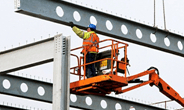Analysis

February 18, 2021
AGC Blames Tariffs for Spikes in Cost of Construction Materials
Written by David Schollaert
Soaring prices and delivery delays for steel, lumber and other materials are squeezing the finances of construction firms already burdened by the pandemic, said the Associated General Contractors of America. The trade group called on the Biden administration to review and rescind a range of trade tariffs, which it claims are contributing to unmanageable price increases for the construction industry.
“The extreme price increases, as reflected in today’s producer price index report and other sources, are harming contractors on existing projects and making it difficult to bid new work at a profitable level,” said Ken Simonson, AGC’s chief economist. “While contractors have kept bids nearly flat until now, project owners and budget officials should anticipate the prospect that contractors will have to pass along their higher costs in upcoming bids.”
In a press release on Wednesday, the AGC detailed how price hikes, in many cases to record-setting levels, are delaying deliveries and compounding the disruptions from COVID. At the beginning of the pandemic, the price for construction-related materials and services both declined, but have diverged sharply since last April, Simonson said. A government index that measures the selling price for materials and services used in new nonresidential construction increased 2.5 percent from December to January and 10.7 percent since April. Meanwhile, the producer price index for new nonresidential construction—a measure of what contractors say they would charge to erect five types of nonresidential buildings—increased only 0.2 percent over both the latest month and the nine months since April.
AGC officials noted that although there are many causes for price spikes in key building materials, tariffs on lumber and steel are contributing factors. They urged the Biden administration to not only rescind these tariffs to provide immediate relief to the sector, but also called for the administration and Congress explore new ways to expand capacity for a host of key construction materials, for example, by reviewing other regulatory barriers that bear upon logging and steel production.
Stephen E. Sandherr, AGC’s chief executive officer, concluded that “left unchecked, these rising materials prices threaten to undermine the economic recovery by inflating the cost of infrastructure and economic development projects. Widespread harm is caused by maintaining tariffs on products that so many Americans need to improve their houses, modernize their infrastructure and revitalize their economy.”
By David Schollaert, David@SteelMarketUpdate.com






